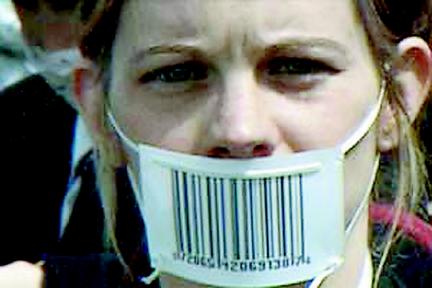Infectiously hostile, Mark Achbar (co-director of Manufacturing Consent: Noam Chomsky and the Media) and Jennifer Abbott's The Corporation demonstrates that the U.S. corporate entity, if seen as a person, would (and does) exhibit all the characteristics of a sociopath. Imbued with all the legal rights of a U.S. citizen since the mid-1800s, the American corporation behaves remorselessly, existing only to satisfy its own selfish goals. The imperative to gain profit, with a reckless disregard for the well-being of others, leaves the corporation in a morally reprehensible position: In order of importance, money must be placed above all else, allowing the individual no opportunity to flourish.
Among the film's wealth of talking-head testimonies (including CEOs, advertising specialists and, most notably, Michael Moore and Noam Chomsky), Dr. Robert Hare, consultant to the FBI on psychopaths, contends that the corporation has “all the characteristics of a prototypical psychopath.” The Corporation makes it difficult to argue, or believe, otherwise. In fact, this brooding, strikingly assembled documentary bludgeons its audience with so many troubling questions (each of which is provided with equally disconcerting answers), so many horrible atrocities and such a large array of outrageous accusations, that the film threatens to become overbearing, stylistically and thematically.
Never less than compulsively watchable, The Corporation makes good use of its daunting running time (145 minutes), constantly spewing out revelation after revelation, threatening to move the viewer into a state of hysteria. However, the film often resorts to heavy-handed MTV stylistics to get its points across, none of which is necessary—especially when the filmmakers have such an intimidating display of intellect at their disposal. The film so desperately wants to keep its audience entertained, it often presents us with images of little, or no, interest (apples being picked, eagles soaring, etc.); these are lined up against carefully chosen, often despairing images (many of these emerging from “simple” television commercials, advertising cereal, toys, etc.), each of which carries a particular, if sometimes inflated, purpose.
The film drowns its audience in such an overwhelming parade of absurdities and allegations, one is often left with a feeling of déjà vu; the means of attack are different, yet the target is always the same, hovering ominously over the proceedings like a dark cloud. Understandably, there are times when the filmmakers lose control of the picture, often contradicting themselves, and their message, only to look down upon their audience for being led astray by these very contradictions. This being a documentary, the directors have no control (outside the cutting room) over the direction in which the speakers lead the picture; however, in supplying their viewers with such an overabundance and variety of orators, the coherence of Achbar and Abbott’s message is weakened considerably, possibly creating a divide in the audience.
For a film that makes no attempt at masking its blatant contempt for the advertising industry, The Corporation comes awfully close to resembling a leftist version of Triumph of the Will. The sardonic narration, delivered with scornful ease by Mikela J. Mikael, makes a few stabs at humor, but the goal of the picture is not to generate laughs. (As far as laughter is concerned, I doubt the film could incite anything more than a guilty grimace.) Rather, its aim is to frighten us, to lead us into a fit of fury and indignation, out of which there is no escape but to turn the finger of blame on ourselves (and honestly, who wants to do that?).
As an indictment of the world’s “dominant institution,” the film is massively successful. Capable of inspiring concern, even outrage, in even the most skeptical (or oblivious) of moviegoers/consumers, The Corporation serves as a disquieting, ostentatious and ultimately sobering experience. Despite its flaws (of which there are few), The Corporation is honorable in its intentions, impressive in its persistence and persuasive in its argument.



